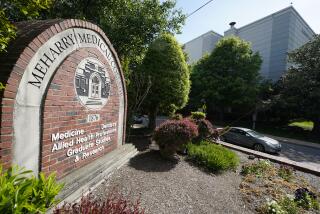2 Hospitals Pool Transplant Resources
- Share via
Sharp HealthCare and Scripps Clinic & Research Foundation will combine their resources and expertise to establish a joint program for organ transplants, the two hospitals announced Thursday.
By combining the assets of the two organizations, hospital officials said they can further advance complicated transplant procedures and offer the costly operations to patients at a cheaper rate.
According to their agreement, Sharp HealthCare will strengthen its role as the county’s leader in transplanting hearts and further develop existing heart-lung and lung transplant capacity; meanwhile, a steering committee, including representatives from both institutions, has been established to develop a liver transplant program at Green Hospital, an acute care component of Scripps Clinic in La Jolla.
“The leadership of Sharp HealthCare and Scripps Clinic both believe very strongly that where there is an opportunity to share the resources necessary to provide what would otherwise be a very costly service, we should do so in hopes of lowering the cost of those services for the benefit of the community,” said Stephen C. Salisbury, a senior vice president at Sharp HealthCare, the parent of Sharp Memorial Hospital.
The partnership will allow the institutions to draw from an increased patient base and eliminate the need for duplicating start-up costs that would be passed along to the patient, Salisbury said. As a result, the partnership should be able to lower the high cost of transplants. Heart transplants cost $70,000 to $120,000, liver transplants more than $150,000.
In addition, the partnership allows the two, nonprofit hospitals to tap into each other’s particular strengths.
“We were looking for added research capability, as it relates to improvements in drugs or other items (needed for transplantation) . . . that’s what Scripps is noted for,” Salisbury said. “On the other hand, we do more applied research, actually working on patients. The applied research is what we can offer to Scripps as they start up their liver program.”
The partnership comes at a time when health officials nationwide are becoming increasingly concerned about the rapid proliferation of medical facilities offering organ transplantation.
Although few hospitals could provide transplants in the early 1980s, advances in technology and medicine have allowed many medical institutions to add it to their list of services. Such services add prestige to hospitals and often net them more patients.
There are now 147 medical facilities offering heart transplantation, up from just 36 in 1984. During the last five years, liver-transplant programs have increased from 15 to 79. In San Diego County this summer, UC San Diego Medical Center added heart, heart/lung, and lung transplants to its kidney program, and Mercy Hospital has announced that it will start offering heart transplants Jan. 1.
But the explosion in the number of institutions that offer transplants has raised both economic and medical concerns for medical administrators.
Although many hospitals have waiting lists of patients who need transplants, organ donation has not kept pace with demand. As a result, officials say, many of these hospitals won’t have the opportunity to conduct transplants, leaving expensive operating rooms and equipment unused. Worse yet, officials fear that the skills of surgeons who don’t perform such complex operations regularly may deteriorate.
But Salisbury, Sharp’s vice president, said its decision to team with Scripps had little to do with market conditions or increasing competition. Local hospital officials acknowledge that Sharp is the county’s leader in heart transplants. Sharp performed the first heart transplant in the county in October 1985 and has completed 65 of them since then.
Salisbury denied that the partnership was established primarily to gain a monopoly on patients in the county or “freeze out” other San Diego hospitals that have recently entered the transplant field.
“I don’t think it’s appropriate for one to characterize the cooperation of two community, not-for-profit institutions, for the purposes that we have stated, as having anything to do with a competitive factor,” Salisbury said.
“Our partnership is not designed to exclude other hospitals,” he added. “If there are other hospitals that want to conduct transplants, and if there are ways we can help them, we will be willing to cooperate with them.”
Although there are other medical institutions vying for heart transplants, David Gollaher, a Scripps vice president, said Scripps’ entry into the transplantation business aims at an unoccupied niche. Gollaher said, “There is not a liver program in San Diego County.”
Gollaher said he was unconcerned about the failure of other liver transplant programs that were launched within the last six years in the county by Sharp and UC San Diego Medical Center.
“Those failures happened quite a while ago,” Gollaher said. “Technology in organ transplantation has come a long way since then. We believe that we’ll have a very successful program.” Scripps already has the facilities to launch a liver transplant program and plans to select a lead surgeon within the next 60 days.
Both Mercy Hospital and UCSD Medical Center officials dismissed notions of a “freeze-out” by Scripps and Sharp, but conceded that the partnership will play a significant, if not dominant, role in transplants.






